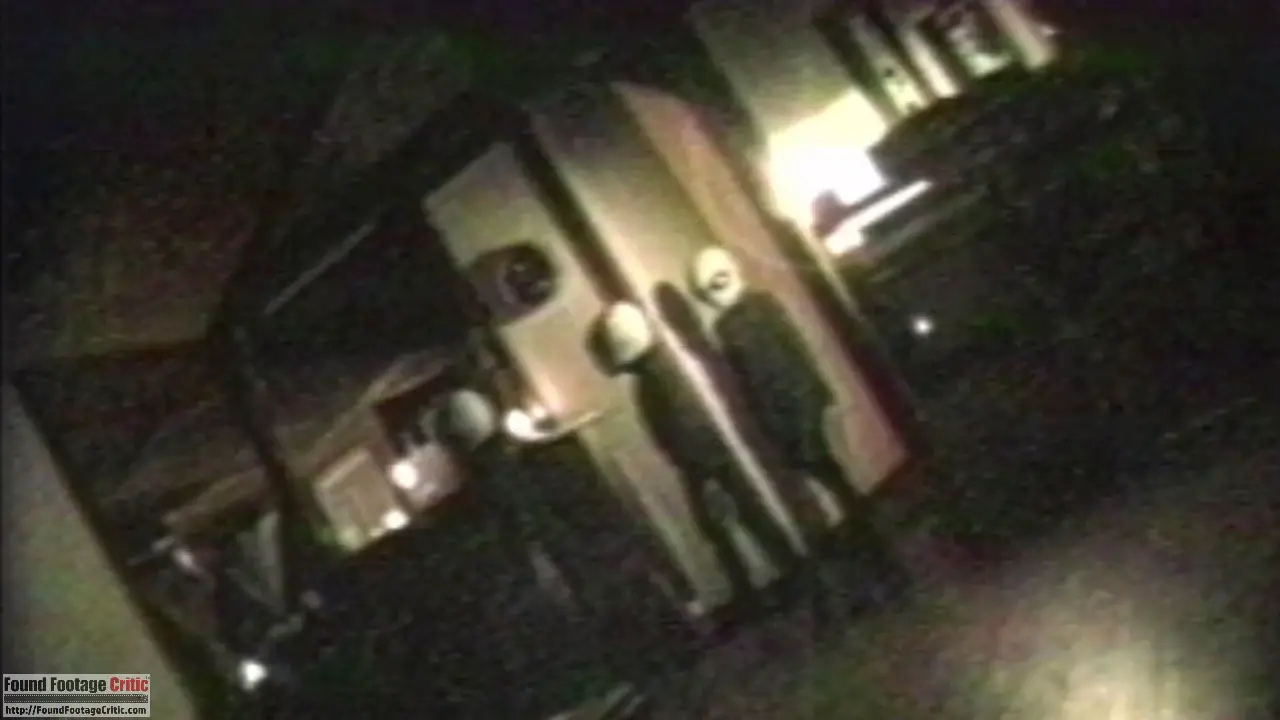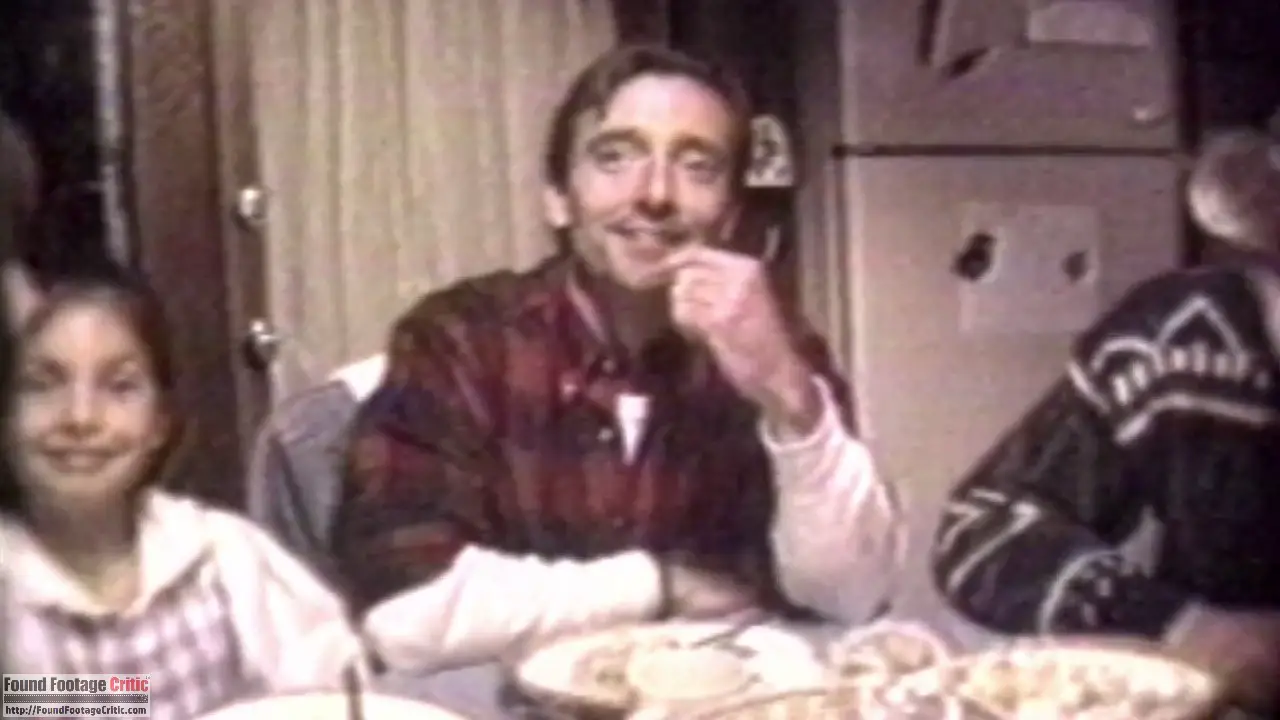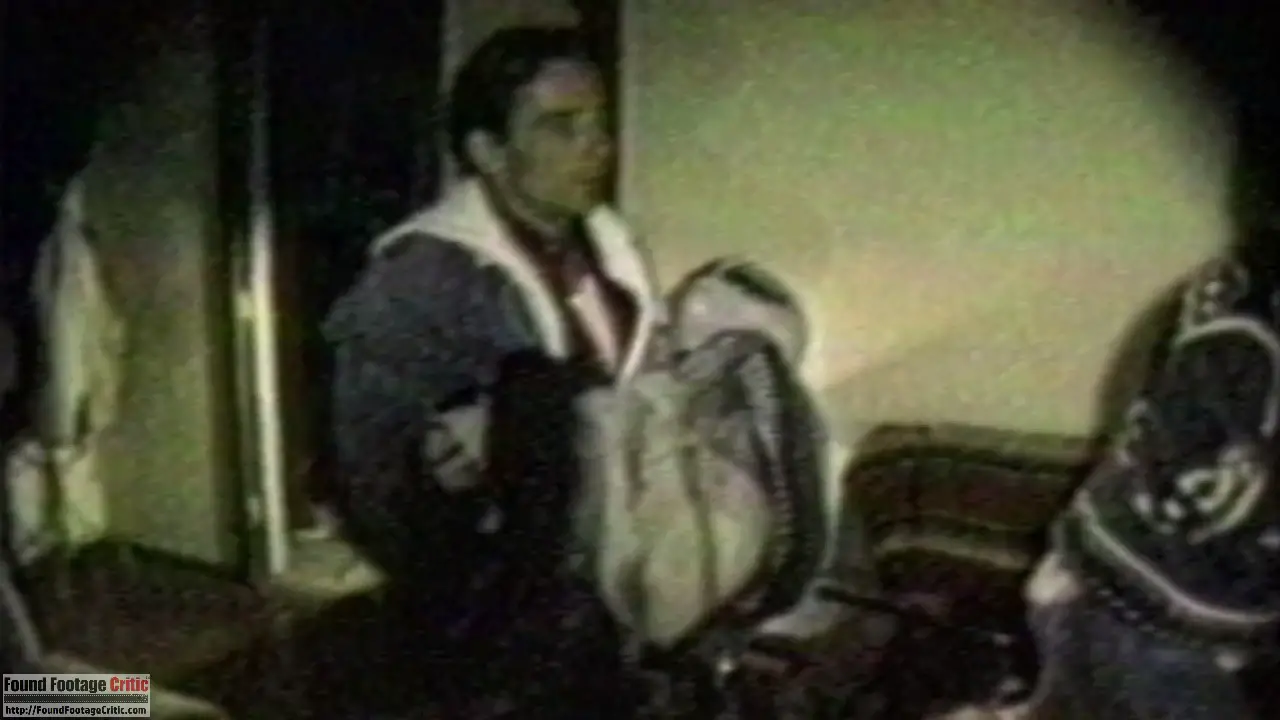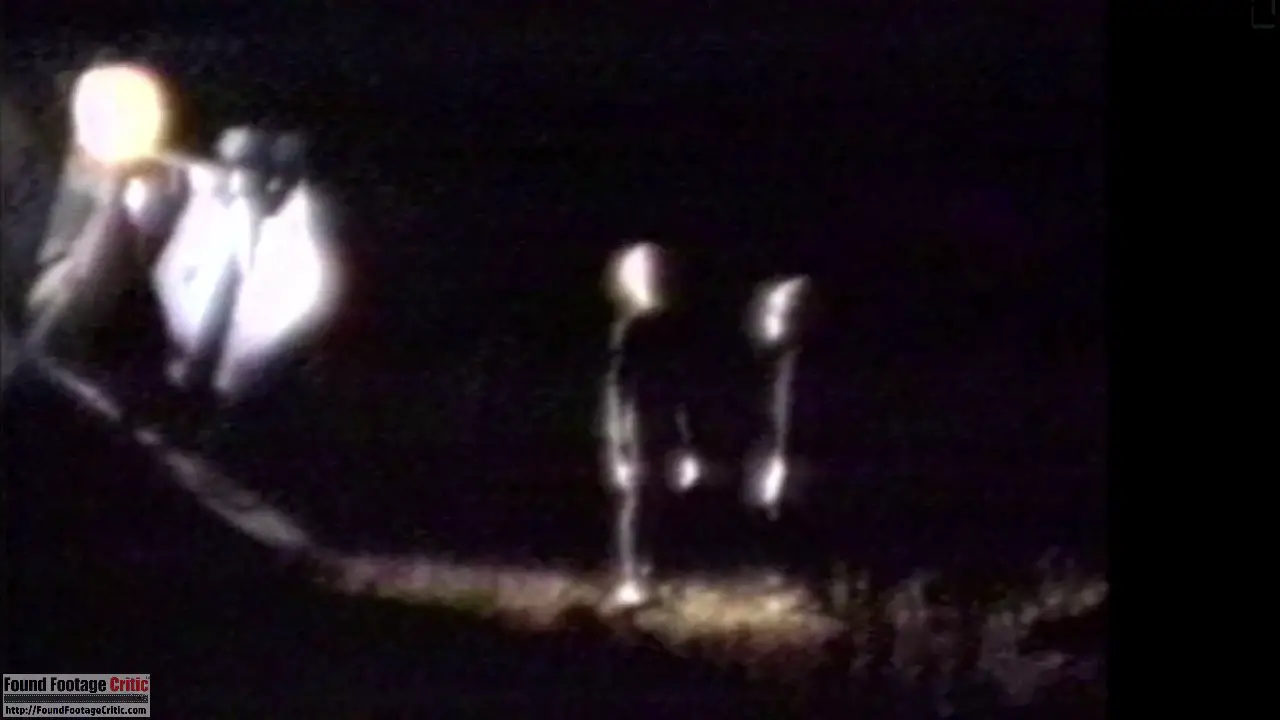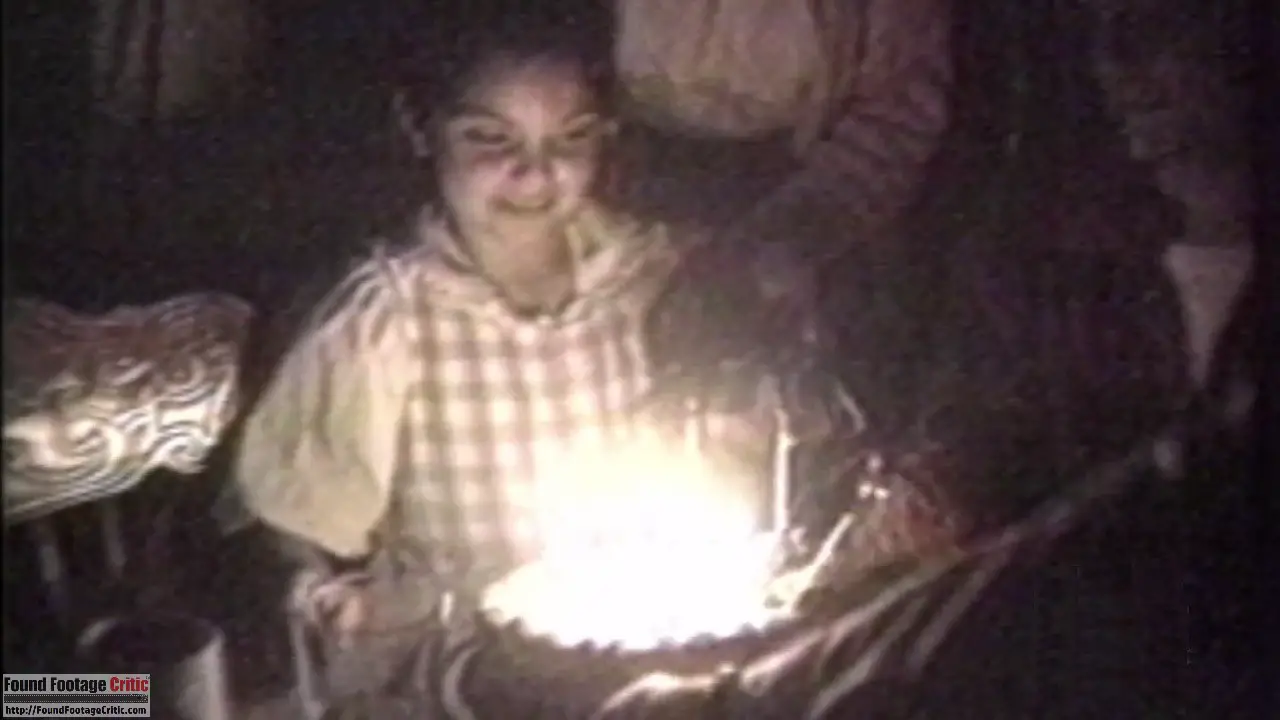 “UFO Abduction” is a found footage horror/sci-fi film written and directed by Dean Alioto. The film follows a family celebrating a birthday part that is disrupted by aliens that lay siege on their rural Connecticut home.
“UFO Abduction” is a found footage horror/sci-fi film written and directed by Dean Alioto. The film follows a family celebrating a birthday part that is disrupted by aliens that lay siege on their rural Connecticut home.
The film opens with an on-screen message explaining the source of the footage about to be presented—“The uncut video footage you are about to see contains the most important evidence yet made public regarding this phenomenon. This evidence is from the Northwoods, Connecticut, U. F. O. CASE 77. On the evening of October 8, 1983, a young man was videotaping his niece’s fifth birthday party. As the night’s strange occurrences took place, he kept his video camera running., recording the entire event.”
The movie transitions to the found footage which takes place at the rural home of the Van Heese family who are celebrating the fifth birthday of Michelle, daughter of eldest brother Eric. Filming the event is brother Michael using his new handheld video camera.
The family takes up arms in an attempt do defend themselves against the alien invaders
The lights are turned off so Michelle can blow out her birthday candles. Surprisingly, after Michelle makes her wish and blows out the candles, the lights don’t work. The three brothers, Michael, Eric, and Jason go outside to check the fuse box, only to find it charred and smoking.
While still outside, the group sees a flash of light in the distance. The three brothers head out into the woods towards the neighboring property to investigate. What they find is beyond belief—they come across what appears to be an alien spacecraft and at least three humanoid aliens standing outside.
Certain that they’ve been spotted by the alien invaders, the three brothers run back to the house, locking the doors behind them. The situation goes from bad to worse when the aliens apparently followed the brothers and lay siege on the small house. The family takes up arms in an attempt do defend themselves against the alien invaders—what happens next is both shocking and terrifying.
Actual Found Footage of an Alien Invasion?
Created in 1989, UFO Abduction is considered by many to be the first pure found footage film. With a budget of only $6,500, Director Dean Alioto cites limited funds and desperation as the drivers for using this style of filmmaking.
Someone took one of the VHS copies of UFO Abduction, cropped off the opening and closing credits, and distributed the film in the UFO community as evidence of alien life
UFO Abduction has a sorted history that’s as riveting and incredible as the film itself. After completing UFO Abduction, Dean Alioto signed a distribution deal and handed over the original master and all artwork. Shortly thereafter, the distribution company literally burned to the ground from a fire, destroying the film and bankrupting the company.
A handful of VHS copies of the film were sent to mom and pop video stored before the fire. Apparently, someone took one of the VHS copies of UFO Abduction, cropped off the opening and closing credits, and distributed the film in the UFO community as evidence of alien life. For a full five years, the footage created by Dean Alioto was considered the best evidence of alien life. The footage even passed the scrutiny of veteran UFO researchers and a U.>S. Airforce lieutenant Colonel. In 1994 the media tracked down Dean Alioto and published a story (on Fox network) explaining what had happened
In 1998, ten years following the creation of UFO Abduction, director Dean Alito remade the film for Dick Clark Productions under the title Alien Abduction: Incident in Lake County (a.k.a. The McPherson Tape). To this day, many people in the UFO community consider the UFO Abduction footage to be real. Their mindset is that the 1998 remake is the product of a disinformation campaign orchestrated by the United States government designed to discount the existence of alien life.
We interviewed Dean Alioto and have the full story behind the making of UFO Abduction (1989) and Alien Abduction: Incident in Lake County (1999)—including the infamous warehouse fire and alleged government cover-up!
Below are the links to the full story that the public has never seen, including behind the scene photographs, the never published trailer for UFO Abduction, and a video clip of the 1994 Fox network TV show Encounters segment covering UFO Abduction.
- Dean Alioto: The McPherson Tape, UFO Abduction, and Alien Abduction [Part 1]
- Dean Alioto: The McPherson Tape, UFO Abduction, and Alien Abduction [Part 2]
Found Footage Cinematography
The found footage cinematography in UFO Abduction is nothing short of pristine. Although he doesn’t make an appearance on-screen, Director Dean Alioto plays the role of Michael and shoots one-hundred percent of the film. Dean Alioto does a wonderful job at making the videography look natural and appropriately amateurish.
Many filming techniques are employed that enhance the perceived authenticity of the film. When the panic-stricken character Michael is running back to his house after encountering the alien ship, he appropriately waives the video camera haphazardly at his side and towards the ground while filming and running. Further, when Michael and his brothers walk through the woods at night to find the source of the flashing light, Michael keeps the camera light off to save the batteries, leaving him essentially filming in pitch blackness. These two techniques are very risky, especially in the 1980s where cinematography was traditionally more conservative.
Dean also does an exceptional job filming things that don’t necessarily further the plot but are of interest to the character, Michael. During one particular scene during the blackout, Michael films a lit lantern in the house, zooming in on the flame. Small nuances like these increase the perceived realism of the film.
UFO Abduction also does an exceptional job at making the end product look like a home video through the infusion of realistic static and defects typically encountered on VHS. Another key addition to the film and contribution to the found footage genre is the inclusion of video artifacts as a prelude to alien activity.
All of the techniques mentioned above, which were novel at the time UFO Abduction was creatd are now common tropes in the modern found footage genre.
Filming Reason
The filming reason provides a found footage film with the justification for the character(s) filming a feature length’s worth of film. UFO Abduction is flawless in its filming reasons.
The film starts with character Michael filming his niece’s birthday party. This filming reason is coupled with novelty of Michael excited over using his new handheld video camera. When their house loses power, Michael appropriately uses his camera as a light source, further justifying the continued filming.
After the three brothers discover the alien ship and its occupants, Michael’s motivation for filming shifts to capturing evidence of extraterrestrial life—a filming reason which carries through the duration of the film.
The filming reasons described here are now commonplace in the modern found footage genre.
Found Footage Purity
The found footage purity is a measure of how well the cinematography, filming reason, and other elements of the film come together to form an end-product that looks like actual found footage. The found footage purity in UFO Abduction is as perfect as any film can strive to be.
Further adding to the genuineness of the film is one scene where Michael says that he’s turning off the camera light to save the batteries. This one scene speaks volumes as it further justifies how the camera can continue operating for the duration of the film, which takes place during the course of a single evening.
When taken as a whole, the film comes across as shockingly realistic—so much so, that for a period of five years a pirated version of the film was considered by the global UFO community to be proof of actual alien evidence. Even after the true roots of the film were revealed, some experts still believed that UFO Abduction was real, asserting that the United States government was behind a disinformation campaign.
Acting
The acting throughout UFO Abduction is nothing short of flawless. The improv background of the cast coupled with the lack of a full script results in a performance that comes across as wholly realistic. Additionally having the actors not playing for the camera and actively having them talk over one another during side conversations bolsters the perceived authenticity of the film even further.
Although Dean Alioto does not appear on-screen, his portrayal of the middle child, Michael, is exceptional. His cinematography coupled with the emotion brought forth in his voice acting carries much of the emotional charge of the film. Tommy Giavocchini does a wonderful job playing the eldest brother Eric, the patriarchal leader of the family during this time of crisis. Patrick Kelley successfully plays the youngest brother, Jason—Dean Alioto, Tommy Giavocchini , and Patrick Kelley maintain a believable chemistry throughout the film.
Shirly McCalla delivers an outstanding performance as the mother to the three brothers. Her dialog and reactions to the events unfolding around her come across as completely real. Laura Tomas’s performance as daughter Michelle is also exceptional. Christine Staples as Eric’s wife Jamie and Stacy Schulman as girlfriend Renee both perform admirably in their respective roles.
Plot
Dean Alioto and his film Alien Abduction contributed many noteworthy techniques that are essential tropes of the modern found footage genre. UFO Abduction is ethe first (or one of the earliest) films to adopt each of the techniques listed below:
- Haphazard filming while a stressed character is running or in danger
- Filming using natural lighting and realistic framing
- Filming superfluous topics of interest to the character that are not necessary to the plot
- Realistic static and video artifacts indicative to filming on VHS tape
- Video artifacts added as a prelude to alien (or supernatural) activity
- Hiring improv actors for filming
- Improv dialog based on a blocked-out story rather than a full script
- Actors that don’t play to the camera
- Overlapping dialog and conversations
- Flawed dialog (studders, mistakes)
- Compressed (or even one-take) filming period to create a sense of realism
- Using the camera as a light source
- Filming to capture evidence
Additional Resources
- UFO Abduction (1989) Movie Trailer [EXCLUSIVE]
- Fox Network Encounters Segment on UFO Abduction (1989) [EXCLUSIVE]
- Alien Abduction: Incident in Lake County (1998) (a.k.a. The McPherson Tape) Movie Review
- Dean Alioto: The McPherson Tape, UFO Abduction, and Alien Abduction [Part 1]
- Dean Alioto: The McPherson Tape, UFO Abduction, and Alien Abduction [Part 2]
- Audio Interview of Director Dean Alioto (Episode #80, Found Footage Files Podcast)

